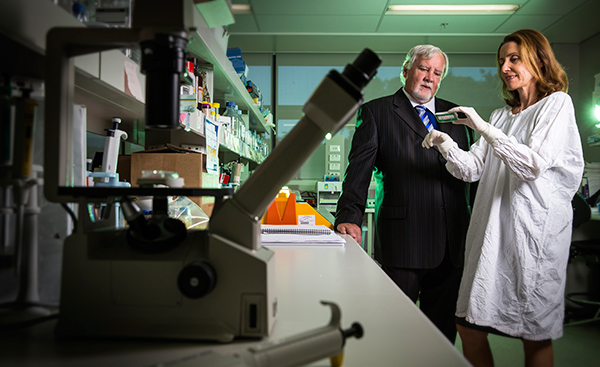April 17, 2015
Anti-cancer formulation begins clinical trial
A new drug developed entirely at UOW for the treatment of metastatic colorectal cancer (mCRC), has begun a phase 1 trial in humans in the Illawarra.
 "A precedent has now been set for translational research from bench top to the patient in the Illawarra.” Professor Marie Ranson, pictured here with Professor Philip Clingan.
"A precedent has now been set for translational research from bench top to the patient in the Illawarra.” Professor Marie Ranson, pictured here with Professor Philip Clingan.
The phase 1 trial is testing the new drug in a small group of patients for the first time to evaluate its overall safety, determine a safe dosage and identify side effects. The trial is only available to patients that have failed all other available treatment options and is not for patients on active treatments.
The trial is a culmination of many years of research led by Professor John Bremner, Professor Philip Clingan (pictured above left) and Professor Marie Ranson (pictured above right) who are affiliated with the Illawarra Health and Medical Research Institute, based on UOW campus.
The resulting drug, called Deflexifol, performed very well in pre-clinical testing. The researchers say it has the potential to overcome key adverse events associated with current mCRC treatment regimens. Deflexifol was licensed in 2012 to drug development company FivePhusion Pty Ltd, which has obtained the necessary approvals to test the drug in humans and is conducting the phase 1 trial at Southern Medical Day Care Centre. This trial will also be available at Liverpool Hospital soon.
“Many colorectal cancer patients cannot tolerate existing ‘standard of care’ treatments, which leads to interruption or discontinuation of therapy,”according to Illawarra oncologist Professor Clingan.
“The main benefit of Deflexifol is the ability to deliver an effective chemotherapeutic regimen that patients can tolerate over repeated treatment cycles.” To date, treated patients are tolerating Deflexifol well.
Professor Ranson said that as a basic cancer researcher it was very rewarding to see our drug make it from the laboratory bench into the clinic.
“This has only been possible with the faith and funding from local charities as well as government funding. I can only hope that Deflexifol performs in humans as well as it has done in pre-clinical trials. In any case, a precedent has now been set for translational research from bench top to the patient in the Illawarra.”
UOW has acknowledged the considerable financial support that local organisations have contributed to the project over the years, including the Illawarra Cancer Carers Inc., Kiama, Minnamurra and Gerringong Sunrise Rotary, The Robert East Memorial Fund, Southern Medical Day Care Centre, the Gay Bates Memorial Foundation and UOW Alumni. The project has also received Federal Government funding from the National Health and Medical Research Council (NHMRC) and AusIndustry’s COMET scheme.
Professor Ranson will share her research at Big Ideas, a free public event at UOW in August.
Media contact: Bernie Goldie, Media Consultant, UOW, + 61 2 4221 5942 or bgoldie@uow.edu.au.


